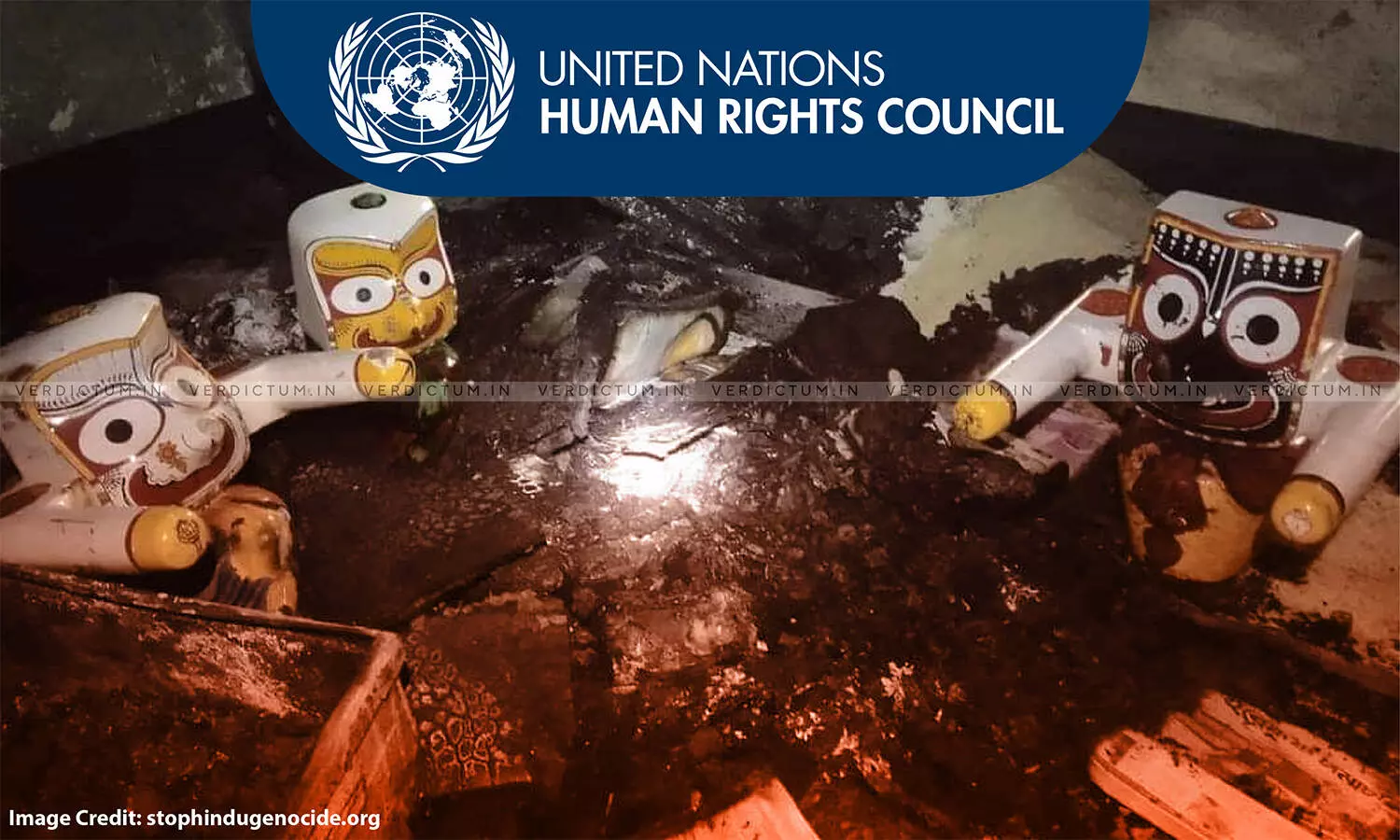
Human Rights Organisation Approaches UNHRC Seeking Intervention Against Systematic Persecution Of Religious Minorities In Bangladesh
 |
|The Centre for Democracy Pluralism and Human Rights (CDPHR) has filed a complaint with the United Nations Human Rights Council (UNHRC) regarding the human rights violations against religious minorities in Bangladesh in the aftermath of the recent coup.
This complaint highlighted the ongoing persecution, forced conversions, and gender-based violence predominantly targeting Hindu communities under the current interim government led by Chief Advisor Shri Mohammad Yunus. "Reported incidents paint a grim picture of the widespread and systematic violence against Hindus. Since August 5, 2024, there have been 205 reported incidents of minority persecution, primarily targeting Hindus," the complaint alleged.
Advocates Shashwat Parihar and Niyati Sharma submitted the complaint to the President and Members of the UNHRC on behalf of the CDPHR (Complainant).
The complaint outlines the widespread incidents of violence, discrimination, and forced conversions suffered by religious minorities in Bangladesh. It alleges that religious minorities, especially Hindus, are subjected to an “atmosphere of extreme fear and anxiety,” with crimes against them, including abductions, sexual harassment, and desecration of religious sites, becoming increasingly common.
"The Minorities do not enjoy any right in Bangladesh, their religious places are desecrated, Minor girls of minorities are abducted and are forcefully converted to Islam. Girls of Hindu community face Sexual harassment. Properties belonging to minorities are forcefully taken away and are encroached and many other crimes are on increase against the Minorities in Bangladesh. No action is taken against the accused and the criminals, even the justice system and judiciary fail to take care of the Right of Minorities in Bangladesh," the Complainant alleged.
The complaint notes a disturbing decline in the population of these minorities, attributed to the persistent discrimination and organised crimes committed against them.
The complaint provides detailed accounts of numerous incidents that highlight the severity of the situation. It alleged incidents of vandalisation and looting of Hindu-owned shops in Dinajpur, the burning of Hindu houses in Jessore, and the desecration of Hindu temples across various districts, including the ISKCON temple in Meherpur. The complaint also alleges how Hindu women are particularly vulnerable, facing gender-based violence, forced conversions, and marriages under duress. The CDPHR's report also reveals the tragic stories of “targeted abductions” of minor Hindu girls, who are often forcibly converted to Islam and married to their abductors, with little to no intervention from the authorities.
CDPHR further alleged, "The constitution and laws of this People's Republic are interpreted as preferential towards Muslims. In many aspects of life, religious minorities, including Hindus face discrimination due to their faith...In Islam, it is considered an achievement to convert a Hindu to Islam and in doing so one can earn a blessing."
The CDPHR's complaint condemned the Bangladesh government for violating several international human rights treaties to which it is a signatory. These include the Convention on the Elimination of All Forms of Discrimination Against Women (CEDAW), the International Covenant on Civil and Political Rights (ICCPR), and the Convention on the Rights of the Child (CRC). With the continuing “oppression of non-Islamic people in Bangladesh”, the complaint alleged that despite Bangladesh’s commitments under these treaties, the government has failed to protect the rights of its religious minorities, thereby violating international law.
"The concerns that perpetrators of torture often enjoy impunity due to inadequate investigations and prosecution. Discrimination by orders for the minorities, abduction, torture, land grabbing, desecration of religious institutions and places, forcible eviction, violation against minority women, electoral violence etc. caused a serious threat to the existence of minority people in Bangladesh and of their rights. That led minority to a huge migration to India and other places. Though Bangladesh has ratified all major international human rights treaties and conventions and is legally bound to comply with these international human rights treaties, but it does not comply with them so far as the minorities are concerned," the complaint alleged.
In light of the ongoing atrocities, the CDPHR urged the UNHRC to take immediate action. The complaint calls for the deployment of a fact-finding mission to Bangladesh to assess the ground situation and document the human rights violations. Additionally, it seeks compensation for the victims and sanctions against the Bangladesh government for failing to uphold its international obligations.
CDPHR pleaded UNHRC to "direct the government of Bangladesh to act wisely to protect minority rights and enforce sanction for failure of People's Republic of Bangladesh to control and eliminate persecution of the Minorities in Bangladesh."
The submission concludes with a plea for the UNHRC to direct the government of Bangladesh to take immediate and effective measures to protect the rights of religious minorities, ensure justice for the victims, and prevent further persecution.